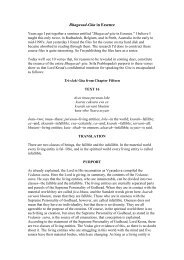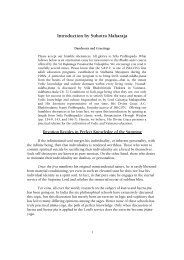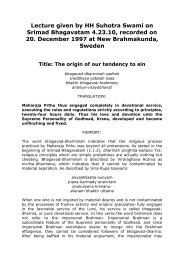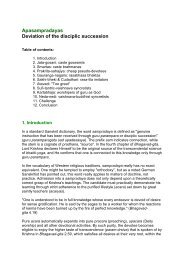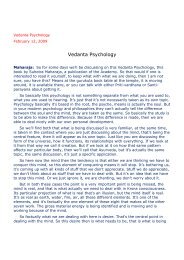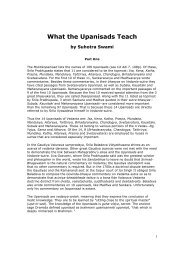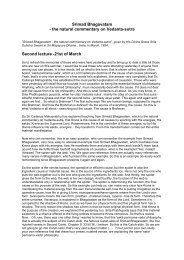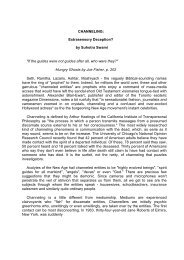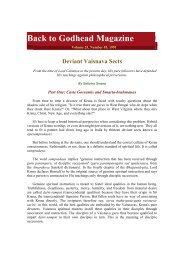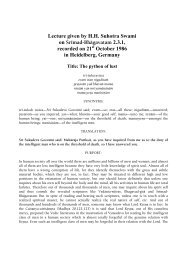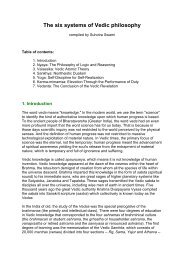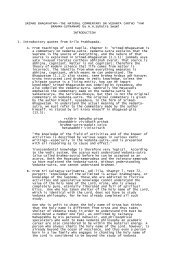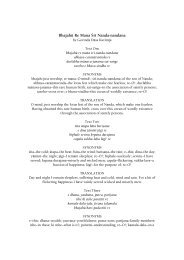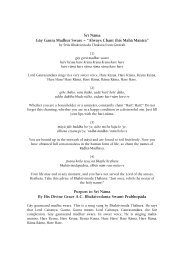Danda 1995 - Suhotra Maharaja Archives
Danda 1995 - Suhotra Maharaja Archives
Danda 1995 - Suhotra Maharaja Archives
- No tags were found...
You also want an ePaper? Increase the reach of your titles
YUMPU automatically turns print PDFs into web optimized ePapers that Google loves.
three modes of material nature, He is unseen by those who are dominated by thesethree modes. One must therefore bečíme dhira, or undisturbed by the modes ofmaterial nature. The process of yoga may be practiced by one who is free fromthe agitation of these modes. Therefore yoga is defined in this way: yogaindriya-samyamah. As previously explained, we are disturbed by the indriyas, orsenses. Moreover, we are agitated by the three modes of material nature, whichare imposed upon us by the external energy. In conditional life, the livingentity moves turbulently in the whirlpool of birth and death, but when one issituated on the transcendental platform of visuddha-sattva, pure goodness, hecan see the Supreme Personality of Godhead, who sits on the back of Garuda. LordBrahma offers his respectful obeisances unto that Supreme Lord."The essence is that material goodness is still influenced by passion andignorance. In material goodness, the senses still disturb. Thus the Lordremains unseen. In transcendental goodness (vasudeva-sattva), the senses aredirectly engaged in yoga (connection to Krsna). Thus the devotee sees Krsnadirectly. There is no sensual agitation, or in other words disturbance ofpassion and ignorance, on this platform.Question from Bhakta MaximDecember 22, <strong>1995</strong>If you do not mind I'd like to comment on the question raised by Vrajendre KumarPrabhu regarding self-envy (sorry to bring it up again as the topic is so farbehind.) If I am not mistaken – please correct me if I am wrong -- the word"envy" has two different meanings in English: 1) jealous attitude to other'shappiness or success (the usual meaning) and 2) animosity (that is more rare,and is more understandable in terms of self-envy, i.e. causing harm to oneselfby being enimical to Krsna).In Russian the two meanings merge together as the Russian word for "jealousattitude" does not have the second meaning whatsoever, only a tinge of. Maybethis is the cause of the confusion.Please forgive me for rushing in where angels fear to tread.Answer by <strong>Suhotra</strong> SwamiDecember 22, <strong>1995</strong>According to my big etymological dictionary, *envy* is traced to Latin *vide*,"to see." *Vide* in turn is related to *Veda* ("I know," originally "I see").The word *inuidere*, to see intensely, based on *vide*, branches out from Latininto English as *envy*. *Induidere* actually has two forms that have given twowords to the English language. From *inuidia* (noun) transformed to Vulgate*inveia* dones through Old French *envie* the English *envy*. From theadjective *inuidiosus* comes the English *invidious*. Anyway, the ultimate rootis the Sanskrit *vid* (Veda is formed from this verbal root), from which we getso many Indo-European words, like *wisdom* in English, *wissen* in German,*veda* in Czech, the Greek *idein* which comes into many languages as *idea*,and so on. The essential semantic indication is the intense, antagonisticlooking at some object. We know that original envy is of the living entity forKrsna. Krsna is the Self of our self. So the "original" original meaning ofenvy is to look antagonistically upon one's own Self, Krsna.TREE WASN’T THERE BECAUSE NOBODY SAW ITQuestion from Vijnana dasOctober 7, <strong>1995</strong>



